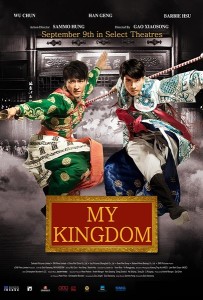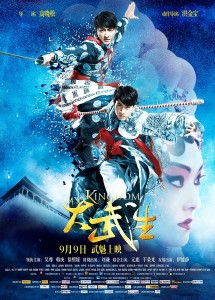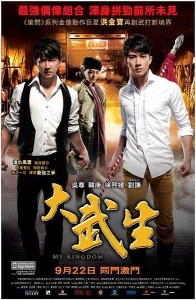My Kingdom
大武生
Hong Kong/US/China, 2011, colour, 1.85:1, 103 mins.
Director: Gao Xiaosong 高晓松.
Rating: 6/10.
Weak male leads and an unsuitable director sap the juice from a promising action drama.
Northern China, during the closing days of the Qing dynasty. The Meng family is to be executed by decree of the Prince Regent. At the execution, the voice of five-year-old Meng Erkui (Tao Yang) touches the heart of Beijing Opera star Yu Shengying (Yuan Biao), who takes him on as a pupil alongside seven-year-old orphan Guan Yilong (Xie Shangchen). Yu Shengying, who has the golden Da Wu Sheng 大武生 (“Mightiest Opera Warrior”) plaque from the Prince Regent, is challenged by his arch-rival, Shanghai grand opera master Yue Jiangtian (Yu Rongguang), to a duel of “opera warriors”, as it has been 30 years since the last contest between Northern and Southern styles. The boys watch as Yue Jiangtian wins the spear fight in a teahouse and Yu  Shengying has to surrender his plaque. Yue Jiangtian tells him to come and find him in Shanghai when he’s ready for another match. Yu Shengying retires from the stage and trains the two boys in Beijing Opera and martial arts as they grow up together as brothers. Both dream of avenging Yu Shengying’s defeat and getting the plaque back. When Meng Erkui points out the plaque was awarded by the Prince Regent, who ordered his family’s execution, he says he wants to kill the Regent as well, and Guan Yilong agrees to help. Fifteen years later, Guan Yilong (Wu Zun) and Meng Erkui (Han Geng) have grown into adults and are sent out into the world by Yu Shengying. Arriving in 1920s Shanghai, they find Yue Jiangtian still holds the Da Wu Sheng plaque; but when Yue Jiangtian loses an operatic duel on stage at the Shanghai Grand Theatre, in front of
Shengying has to surrender his plaque. Yue Jiangtian tells him to come and find him in Shanghai when he’s ready for another match. Yu Shengying retires from the stage and trains the two boys in Beijing Opera and martial arts as they grow up together as brothers. Both dream of avenging Yu Shengying’s defeat and getting the plaque back. When Meng Erkui points out the plaque was awarded by the Prince Regent, who ordered his family’s execution, he says he wants to kill the Regent as well, and Guan Yilong agrees to help. Fifteen years later, Guan Yilong (Wu Zun) and Meng Erkui (Han Geng) have grown into adults and are sent out into the world by Yu Shengying. Arriving in 1920s Shanghai, they find Yue Jiangtian still holds the Da Wu Sheng plaque; but when Yue Jiangtian loses an operatic duel on stage at the Shanghai Grand Theatre, in front of  young police chief Lu (Liu Qian), he breaks his spear in anger. Guan Yilong and Meng Erkui are hired as performers and rapidly become stars. Guan Yilong becomes a playboy, determined to win the plaque back from Yue Jiangtian, while Meng Erkui still plots his revenge on the late Prince Regent’s family. But then a surprising discovery alters the dynamics between the two young men, as well as with Yue Jiangtian’s lover, Xi Mulan (Xu Xiyuan), who has become involved with them.
young police chief Lu (Liu Qian), he breaks his spear in anger. Guan Yilong and Meng Erkui are hired as performers and rapidly become stars. Guan Yilong becomes a playboy, determined to win the plaque back from Yue Jiangtian, while Meng Erkui still plots his revenge on the late Prince Regent’s family. But then a surprising discovery alters the dynamics between the two young men, as well as with Yue Jiangtian’s lover, Xi Mulan (Xu Xiyuan), who has become involved with them.
REVIEW
In its opening 15 minutes, My Kingdom 大武生 sets up a promising web of friendship, rivalry and revenge, as two boys in late Qing/early Republican China are schooled in Beijing Opera and martial arts but can only think of avenging their master’s disgrace and killing the imperial regent who wiped out one of their families. Veteran action stars Yuan Biao 元彪 and Yu Rongguang 于荣光 (both opera-trained) bring dramatic substance and fighting verismo to their roles as arch-rival masters and, as the story shifts forward to 1920s Shanghai with the two boys now grown up, an interesting, if still formulaic, revenge drama looks on the cards. But then the movie progressively starts bleeding its potential.
There’s nothing inherently wrong with the screenplay by noted poet-playwright-screenwriter Zou Jingzhi 邹静之 (Riding Alone for Thousands of Miles 千里走单骑, 2005; The Grandmaster 一代宗师, 2013), but there’s everything wrong with the casting of the two adult leads and the direction by Gao Xiaosong 高晓松. A composer-songwriter and commercials director, Gao has a checkered record with his previous two features – the pretentious Jules et Jim-like Where Have All the Flowers Gone 那时花开 (2002) and the little-seen 1930s rural drama Rainbow 我心飞翔 (2005) – that doesn’t make him seem a natural fit for such a project. With its use of period props and settings, and saturated photography by Hong Kong’s Kuang Tinghe 邝庭和 (Contract Lover 合约情人, 2007) and Lin Huaquan 林华全 (Juliet in Love 朱丽叶与梁山伯, 2000), My Kingdom always looks suitably period and realistic-moody, but there’s no dramatic momentum to the film or strong directorial signature to involve the viewer. The fight scenes, staged by Hong Jinbao 洪金宝 [Sammo Hung] and Qian Jiale 钱嘉乐 [Chin Ka-lok], are as good as one would expect from such action choreographers, and have the extra fillip of using opera styles. But they’re just intervals in a sluggishly directed movie.
The other problem is the casting of two Asian boybanders as the leads – which may be good for local box-office among their fans but in every other respect undercuts the film’s drama. Brunei-born singer-model-gym instructor Wu Zun 吴尊 (who forged his career in Taiwan) and China-born singer-dancer Han Geng 韩庚 (who forged his in South Korea) have the physical skills to play opera performers but not the acting ones to animate their characters beyond anonymously pretty pin-ups. Even Taiwan actress Xu Xiyuan 徐熙媛 [Barbie Hsu], who can pack plenty of screen punch when given the chance, comes over as pallid, while her compatriot, singer-actress Yi Nengjing 伊能静 [Annie Yi, aka Annie Shizuka Inoh], casts hardly a shadow. The powerful physical presence of Yu as the bad guy only points up the weakness of the main male casting.
In the hands of an experienced commercial director My Kingdom might still have worked. As is, it’s a 5/10 movie that rates an extra point for the action scenes.
CREDITS
Presented by China Film (CN), Huanle Jiaoyang (Shanghai) Film (CN), Emei Film Group (CN), SkyLand (Beijing) Film & Television Cultural Development (CN), Shanghai Shang Shi Productions (CN), Celestial Pictures (HK), DW Films (US). Produced by Celestial Pictures (HK), DW Films (US).
Script: Zou Jingzhi, Gao Xiaosong. Original story: Gao Xiaosong. Photography: Kuang Tinghe, Lin Huaquan. Editing: Chris Blunden. Music: Tan Yizhe. Theme song vocal: Han Geng. Art direction: Yang Haoyu. Costume design: Xie Chengxian. Sound: Liu Yaoming. Action: Hong Jinbao [Sammo Hung], Qian Jiale [Chin Ka-lok]. Visual effects: Song Wei, Xiao Yi.
Cast: Wu Zun (Guan Yilong), Han Geng (Meng Erkui), Xu Xiyuan [Barbie Hsu] (Xi Mulan), Liu Qian (Lu, police chief), Yuan Biao (Yu Shengying), Yu Rongguang (Yue Jiangtian), Yi Nengjing [Annie Yi] (Feng), Tao Yang (young Meng Erkui), Xie Shangchen (young Guan Yilong).
Release: China, 9 Sep 2011; US, 9 Sep 2011; Hong Kong, 22 Sep 2011.
(Review originally published on Film Business Asia, 13 Sep 2011.)
